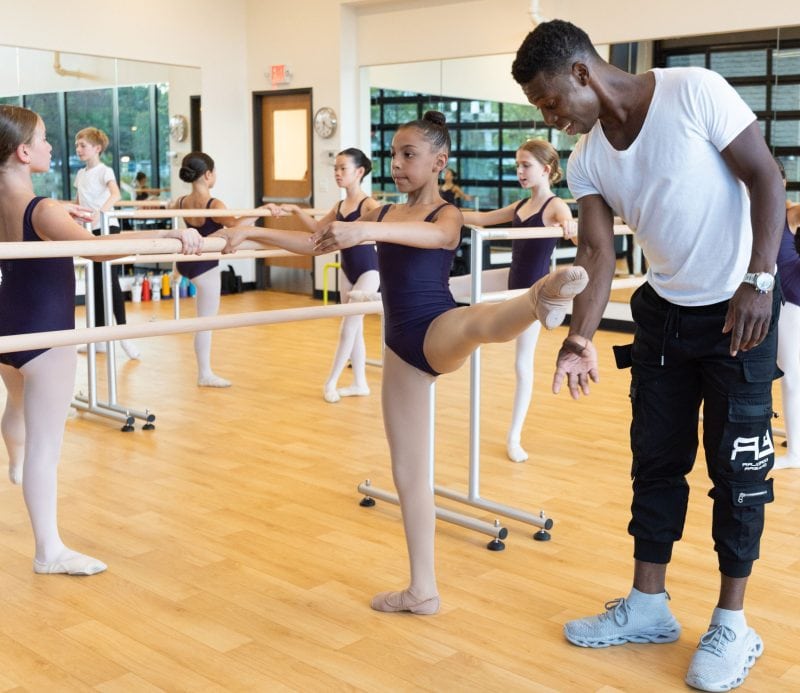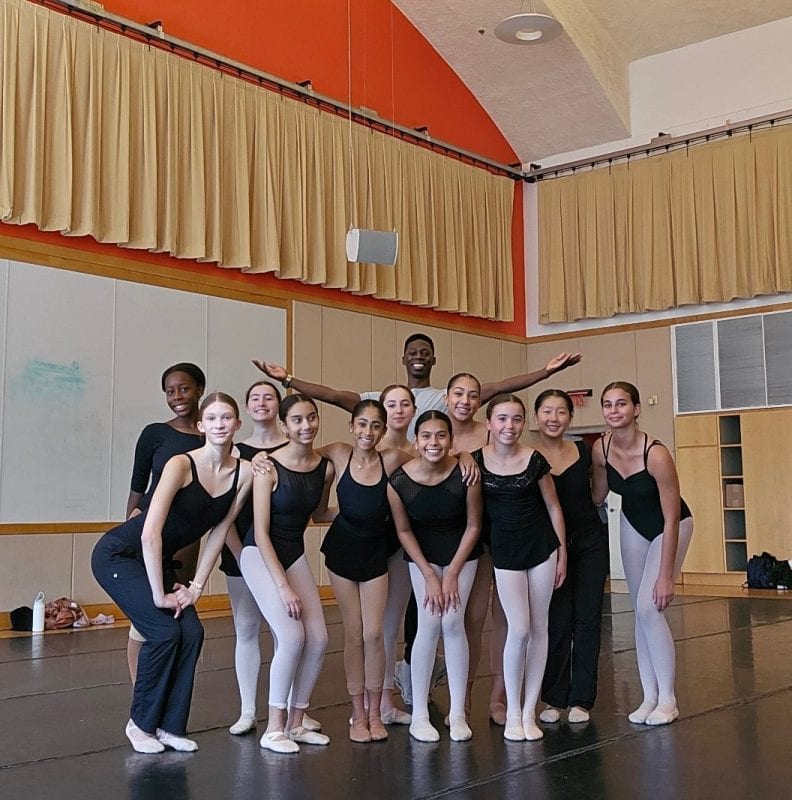©2024 Kim Kokich
In 2012, Brooklyn Mack was the first African American to win a Gold Medal at the Varna International Ballet Competition. He also won the Grand Prix at Istanbul International Ballet Competition, Silver Medals at USA International Ballet Competition, Seoul International Ballet Competition and Helsinki International Ballet Competition, as well as winning the Prince Grace Award In 2007. As a young ballet dancer, he joined The Joffrey Ballet of Chicago as an apprentice and went on to become a principal dancer with Orlando Ballet, The Washington Ballet, and a Guest Principal at American Ballet Theater. He has appeared as a Guest Artist around the world, including with the English National Ballet. And this month CityDance Conservatory was honored to have Brooklyn Mack as a Master Class teacher for a week-long residency.
Mack’s relationship with CityDance began several years ago when he was first asked to appear in one of our Galas, “I got a phone call from a really good friend, and he said ‘Listen, there’s this school and they’re doing some great things and I’m putting together a gala for them and I would love it if you would be a part of it’ and I said of course, I’m absolutely on board and if you’re associated with it it must be good. So, after that first CityDance gala I’ve been back to do quite a few others.”
Those experiences fostered a strong relationship between Mack and CityDance. He says he loves teaching and knows how valuable ballet can be in the life of a young person, even for those who do not continue to dance professionally, “The sheer fact of ballet being so incredibly difficult, you know every day there is this struggle that you’re having to overcome mentally and physically that bolsters your strength and who you are as a person. Your ability to problem-solve. It broadens your horizons exponentially, this type of discipline, because it’s mind, body, and really emotion—soul, if you will. So, it translates to virtually everything. Many of my peers who went to the Kirov Academy ballet school with me, many of them went on to dance with major ballet companies, but there were a number of them who went on to do something else. And every one of those dancers excelled at whatever they did. It didn’t matter whether it was medicine, or law, whatever. They really excelled because the commonality is the discipline, the intensive training, that we went through day after day after day, training to dance.” To have this kind of dedication to ballet, Mack clearly had to love the artform. But it wasn’t his first love.
As a pre-teen, his first love was football. —dangerous, concussion-prone football. Not surprisingly, his mother was less than enthusiastic. She took him to a ballet performance when he was twelve, and he was impressed. And came up with a strategy that would allow him to play football after he learned that some football players took ballet class to improve their agility, “I made a deal with my mom that if she would take me to football try-outs, I’d be willing to do ballet lessons.”
Mack says that in the beginning he hadn’t intended to commit to ballet. His focus was football, “That was my thrust, my purpose…. And I initially thought that I would take ballet for a couple of months, master it, and then just wash my hands of it and play football. But little did I know that ballet would be the first thing that really stumped me…. I guess I would say I was blessed. I was good at everything that I did, whether it was academically or physically—any sport. Anything that I applied myself to generally came pretty quickly. And then I met ballet, and it was the first time that I was, like, ‘Wait a minute’ I’m not good at this’ and that challenged my ego.”
His next step was to go to the library, “I was checking out every book that I could every week, and every video, and watching again and again, intently. And I would be in my school gymnasium trying these things, or in a supermarket, working, working, working to conquer this thing, and the deeper I would delve, the more I would realize there’s so much more to go. You’re never finished. So, it really just roped me in and before I knew it two years had passed.”
By then he was fourteen years old, and after a conversation with a friend with whom he played football, he knew something had changed, “He said ‘We’re going to be in an intra-neighborhood game on Saturday, are you going to come to the game? We need you.’ And I said, ‘No, man, I got dance.’ And he said, ‘You’re always at dance.’ And I said ‘No, I’m not’ and he said, ‘Yes, you are!’ And I realized that it was true. I was there all the time. What started out as an hour and a half six times a week turned into an hour and half and then another hour or two for rehearsal, and I started doing extra classes…. And that’s when I realized I was at a crossroads. Do I really want to do this? Ultimately, I decided to give it a shot. But I made a deal with myself. I had made it through various phases, so I thought, if I’m not at a certain point by a certain age then I’ll stop and concentrate on football. But that didn’t happen. I achieved the goals I set and kept going. And so here I am.”
Brooklyn Mack is in his late thirties now, young enough to still dance professionally as a guest artist and experienced enough to share his knowledge as a teacher. He says that things are very different for today’s students than they were for him twenty years ago, “One of the main differences is that there is just a much bigger sense of globalization with the internet and YouTube at your disposal. There’s just so much that you can draw from and learn and practice on your own to bring into the studio and it doesn’t end once you leave the studio.”
He believes it’s also important to read books about ballet, “I always tell kids that I had to go to this ancient thing called a library and check out books and VHS tapes, Kultur, and I would wear those out not just to get inspiration but to study. I would rewind and play, rewind and play and of course tapes they get worn out and start to break and if they break, you’re out of luck. But now you have these things at your fingertips on YouTube. You can slow-mo and see exactly the mechanisms that the dancers are using—the plié, the dégagé, the timing, the coordination. You can break these things down and get so much out of that. There are so many videos of dancers all over the place and you can draw inspiration and see what everyone else is doing. So that is such a difference between now and twenty years ago.”
Mack, however, advises young dancers to be careful about what they find on the internet, and to “start with some of the bigger schools, like the Royal Ballet class, the Paris Opéra Ballet, or New York City Ballet, depending on the style they’re after.”

Brooklyn Mack was pleased with the students he encountered during his CityDance residency. His approach was to combine classes that would challenge the older, more experienced students, and make sure to teach the basics to those with less experience. “The basics are beneficial for everybody, no matter the level. And it’s important to keep students’ minds stimulated and interested so I try to add elements that are going to feel a little more challenging. And for the younger students it’s still beneficial for them to see, and attempt those combinations because it gives them an understanding of what their bodies can do and helps bridge that connection in their minds as to why they need to master other steps in order to be able to do more complex steps.
And as Brooklyn Mack taught a complicated solo to his last CityDance class this past Saturday, it was clear that our students were captivated by his careful, methodical, respectful, graceful and disciplined approach as he shared his deep knowledge of ballet. As each student went through the final solo it was obvious how much they had learned. Their smiles as they thanked him at the end of class were beautiful to behold.


